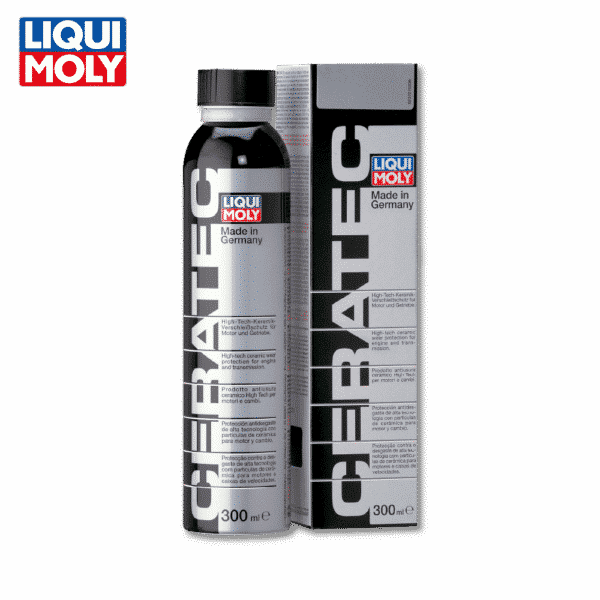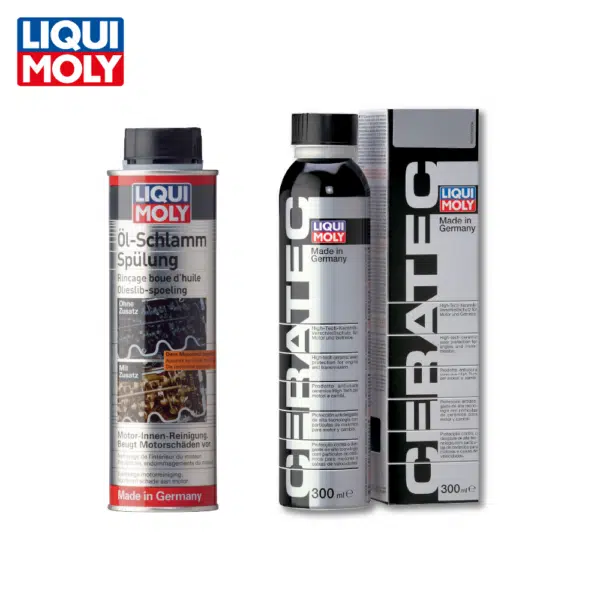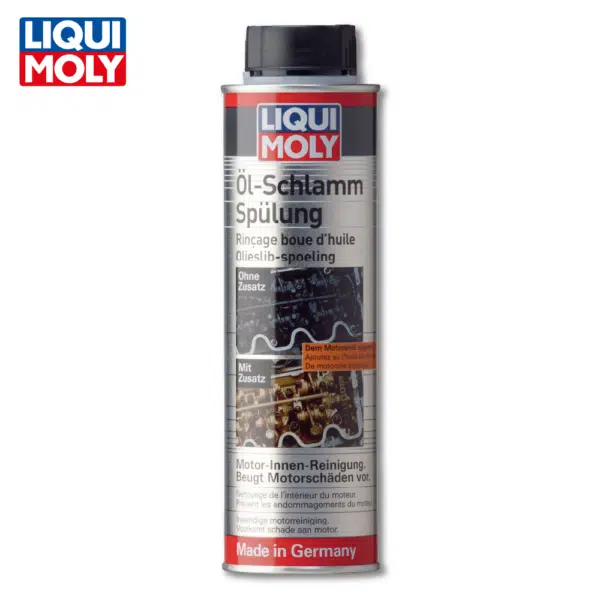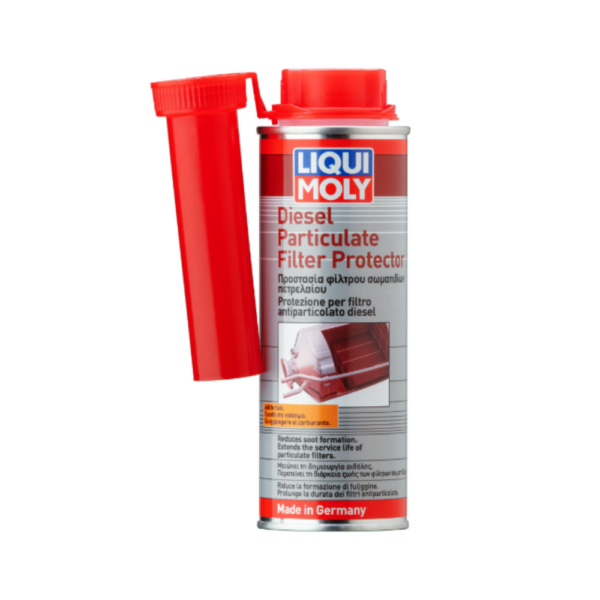Engine rattling can be a vexing issue for vehicle owners, causing discomfort and concern. This article will delve deeper into the world of rattling noise, understanding its causes and the consequences it can bring, and introduce two powerful solutions by LIQUI MOLY, Ceratec, and Hydrovalve.
These additives have earned a reputation for their remarkable ability to combat engine rattling noise and are essential tools for any vehicle owner looking to enjoy a quieter, more efficient, and longer-lasting engine.
What are Engine Rattling Noises?
Engine rattling noise is a common concern for car owners, and it often emerges as a sharp, metallic sound emanating from the internal combustion engine. This noise typically results from the improper combustion of the air-fuel mixture inside the engine’s cylinders, occurring at the wrong time.
The outcome is a rattling noise that can be unsettling for vehicle owners. Another issue making a rattling noise is the piston slap. Inside the car’s engine, the piston may be slapping the cylinder wall, leading to engine noises, and the car rattles as a result.
-
LIQUI MOLY Ceratec£20.40
-
Premium Oil Change Set£37.23
-
LIQUI MOLY Oil Sludge Flush£16.83
-
LIQUI MOLY Octane Booster£8.29
-
LIQUI MOLY Super Diesel Additive£7.17
-
LIQUI MOLY Diesel Particulate Filter Protector£8.10
-
LIQUI MOLY Radiator Stop Leak£6.20
-
LIQUI MOLY Fuel Injection Cleaner£10.02
Major Causes of Engine Rattling Noise
To understand and effectively address engine rattling noise, it’s essential to explore its primary causes in greater detail:
Low-Octane Fuel
Using lower-octane fuel than recommended for your vehicle is a common cause of engine rattling. Lower-octane gasoline can ignite prematurely due to the high temperatures and pressures inside the engine’s cylinders, leading to the characteristic rattling noise. Proper fuel selection is essential to prevent this issue.
Overheating
Engine overheating can trigger engine rattling by causing pre-ignition and detonation of the air-fuel mixture. When the engine runs too hot, it creates an environment where knocking and rattling become more likely. Maintaining the cooling system and coolant levels is crucial to prevent overheating.
Carbon Deposits

The buildup of carbon deposits on the pistons or within the combustion chamber is another leading cause of engine rattling. These deposits can become hotspots, initiating premature ignition and unwanted noise. Regular engine maintenance, including decarbonization, can prevent the formation of these hotspots.
Timing Issues
Incorrect ignition timing can result in engine rattling. Whether the timing is too advanced (firing too early) or too retarded (firing too late), it can disrupt the combustion process, causing rattling. Professional assistance may be needed to adjust the timing accurately.
Spark Plug Problems

Worn or fouled spark plugs often lead to incomplete combustion, which can contribute to engine rattling. Spark plugs are vital for igniting the air-fuel mixture correctly, and their regular replacement is essential for optimal engine performance.
Excessive Engine Load
Overloading the engine, such as by towing heavy loads beyond its capacity, can increase the likelihood of engine rattling. Excessive load can cause strain on the engine, leading to improper combustion and noise.
Incorrect Air-Fuel Ratio
An imbalanced air-fuel mixture can be a significant cause of engine rattling. A lean mixture (more air, less fuel) is particularly prone to detonation, resulting in unwanted noise. Modern vehicles often have sophisticated engine control systems to manage this ratio automatically, but it’s crucial to verify that they are functioning correctly. Clean the throttle valve and MAF Airflow Sensor to prevent an incorrect air-fuel ratio. Exchange the engine air filter once a year as well.

Exhaust System Issues
The exhaust system routes exhaust gases out of the engine and into the atmosphere. If components of the exhaust system, such as the exhaust manifold, exhaust pipe, muffler, or a failing catalytic converter, develop issues like cracks, damage, or clogs, they can lead to unusual exhaust noises. These noises may sometimes be mistaken for engine rattling.
Exhaust Valve Problems
Exhaust valves within the engine’s cylinder head are integral to combustion. Issues related to exhaust valves, such as incorrect valve timing, valve clearance problems, or improper valve seating, can disrupt combustion, leading to engine noise that might be misinterpreted as rattling from the engine compartment.
Get help for your car from our AI Car Expert!
Harmful Impacts of Engine Rattling Noise
Engine rattling noise can have far-reaching consequences, affecting various aspects of your vehicle:
Reduced Engine Efficiency
Engine rattling noise can significantly decrease engine performance and fuel efficiency. This means your vehicle will consume more fuel for the same output, increasing operational costs.
Engine Damage
Prolonged exposure to engine rattling noise can damage critical components, such as pistons, connecting rods, and cylinder walls. Repairing this damage can be both costly and time-consuming.
Decreased Longevity
A rattling engine may not last as long as a well-maintained one, effectively shortening the overall lifespan of your vehicle. It’s essential to address rattling noise promptly to extend the longevity of your engine.
Increased Emissions
Engine rattling noise can increase the emission of harmful pollutants. This affects your vehicle’s compliance with emissions regulations and harms the environment.
Possible Solutions to Engine Rattling Noise
To effectively address engine rattling noise and prevent its harmful consequences, consider the following solutions:
Use Higher-Octane Fuel
One of the most straightforward ways to prevent rattling noise is to switch to a higher-octane fuel. Higher-octane gasoline is less prone to premature ignition and can help mitigate rattling. Always follow the manufacturer’s recommendations regarding fuel type.
Maintain Proper Engine Temperature
Ensure your engine doesn’t overheat by regularly maintaining the cooling system and monitoring coolant levels. Regular inspections and addressing issues like leaks and blockages are essential to prevent overheating.
Clean Carbon Deposits
Regular engine maintenance, including decarbonization, can prevent the formation of hotspots that lead to rattling. Consider using high-quality fuel system cleaners to reduce carbon buildup and promote smoother combustion.
Adjust Ignition Timing
Proper ignition timing is essential to eliminate detonation issues. Consult a professional mechanic to adjust the timing accurately, ensuring that the combustion process occurs optimally.
Replace Spark Plugs
Regularly change spark plugs to ensure optimal combustion. High-quality spark plugs can improve ignition performance and help reduce engine rattling. However, you might have to go for a complete engine rebuild in severe cases.
Avoid Overloading
Be mindful of your vehicle’s load capacity, and avoid overloading the engine, especially when towing heavy loads. Follow the manufacturer’s recommendations for towing and cargo capacity to reduce strain on the engine.
Balance Air-Fuel Ratio
Ensure the air-fuel mixture in your engine falls within the manufacturer’s specifications. Modern vehicles are equipped with sophisticated engine control systems that manage the mixture automatically, but it’s essential to verify that it’s functioning correctly.
Preventing Engine Rattling Noise
Preventing engine rattling noise necessitates the following essential steps:
Use the Right Fuel: Always use the recommended octane rating for your vehicle. Consult your owner’s manual or vehicle manufacturer to determine the correct fuel type for your engine.
Keep the Engine Cool: Regularly maintain the cooling system to prevent overheating. This includes checking coolant levels, inspecting for leaks, and addressing any blockages or issues affecting cooling.
Follow Maintenance Schedules: Stick to recommended maintenance schedules for your vehicle to address potential issues early on. Regular servicing can detect problems before they lead to rattling noise.
Drive Responsibly: Avoid aggressive driving habits, which can put undue stress on the engine. Gentle acceleration and avoiding high engine loads can help prevent rattling.
LIQUI MOLY Ceratec and Hydrovalve Oil Additives: Cornerstones in Combating Engine Rattling Noise

LIQUI MOLY’s Ceratec and Hydrovalve Oil Additives are standout solutions for addressing engine rattling noise and optimizing your vehicle’s performance:
Ceratec: The Friction Fighter
LIQUI MOLY Ceratec is a friction-reducing ceramic engine treatment. It forms a high-load-bearing film on all friction surfaces within the engine, effectively decreasing wear and enhancing engine efficiency. The key benefits of Ceratec include:
Reduced Friction: Ceratec substantially reduces friction, leading to smoother engine operation and lower operating temperatures. This not only minimizes engine wear but also improves overall performance.
Enhanced Protection: The product provides a protective barrier that reduces wear on critical engine components, extending the life of your engine and preventing costly repairs.
Improved Efficiency: Ceratec optimizes engine performance and fuel efficiency, helping you get more miles per gallon and increasing the overall efficiency of your vehicle.
Hydrovalve: The Hydro Valve Cleaner and Lubricant
LIQUI MOLY’s Hydrovalve is a valve cleaner and lubricant designed to address issues associated with engine noise, particularly valve train noise.

Its benefits include:
Valve Train Cleaning: Hydrovalve is highly effective in cleaning the valve train, removing deposits that can lead to noise and reduced performance. This thorough cleaning ensures smooth engine operation.
Lubrication: Hydrovalve ensures proper lubrication of critical engine components, reducing friction and wear and improving the overall longevity of the engine.
Noise Reduction: By effectively addressing valve train issues, Hydrovalve helps quieten engine noise and enhances overall performance. This means a quieter and more pleasant driving experience for vehicle owners.
Benefits of Using LIQUI MOLY Ceratec and Hydrovalve Additives
Utilizing LIQUI MOLY’s Ceratec and Hydrovalve additives offers a range of significant benefits for vehicle owners:
Reduced Engine Noise
Ceratec and Hydrovalve greatly reduce engine noise, providing a quieter and more pleasant driving experience. Engine noise can be particularly bothersome, and these additives help mitigate it significantly.
Improved Engine Performance
By reducing friction, addressing valve train issues, and optimizing the overall functioning of your engine, Ceratec and Hydrovalve enhance engine performance. This translates to smoother operation and a more responsive vehicle.
Extended Engine Life
Reduced wear and better protection provided by Ceratec and Hydrovalve result in a longer-lasting engine. As critical components are safeguarded, your engine’s longevity is significantly extended.
Fuel Efficiency
Enhanced engine performance, reduced friction, and improved combustion result in better fuel economy. You can expect to get more miles per gallon with smoother engine operation.
Conclusion
Engine rattling noise can be a source of annoyance and concern for vehicle owners, affecting engine performance, longevity, and the overall driving experience. However, with effective solutions like LIQUI MOLY’s Ceratec and Hydrovalve, you can address these issues and enjoy a quieter, more efficient, and longer-lasting engine. By incorporating these additives into your regular maintenance routine, you can ensure your vehicle operates at its best while minimizing the troublesome noise of engine rattling. In summary, engine rattling noise can be effectively addressed and prevented with the right measures and products, ensuring a smoother and more pleasant driving experience for all vehicle owners.
In summary, engine rattling noise can be a concerning issue, but by identifying its causes and taking appropriate measures, you can prevent and address it effectively. LIQUI MOLY’s Ceratec and Hydrovalve additives offer valuable solutions to reduce engine noise and improve overall performance, making them essential tools for any vehicle owner looking to enjoy a smoother and quieter driving experience.
Frequently Asked Questions (FAQs)
Can LIQUI MOLY additives fix severe engine problems, or are they preventive measures?
LIQUI MOLY additives are primarily designed as preventive measures and performance enhancers. While they can address certain engine issues, they are not a substitute for comprehensive diagnosis and repair when severe problems occur. When faced with severe engine issues, it is best to consult a qualified mechanic who can conduct a thorough assessment and recommend appropriate repairs.
How much does it cost to fix a rattling engine?
The repair cost of a rattling engine can vary significantly, depending on the underlying issue. Simple fixes, such as replacing worn-out spark plugs or addressing minor ignition timing problems, may be relatively inexpensive. However, more severe issues, like damaged pistons or connecting rods, can be costly to repair. The exact cost depends on the nature of the problem and the labor and parts required.
Can an oil change fix a rattling engine?
An oil change may help reduce engine rattling if the noise is caused by low oil levels or poor oil quality. In such cases, ensuring the engine has the correct oil level and high-quality oil can alleviate the rattling sound. However, it’s essential to note that an oil change won’t address other underlying issues that may be causing the rattling, such as damaged engine components or improper fuel ignition.
What happens when the wrong fuel reaches a spark plug?
When the wrong type of fuel reaches a spark plug, it can disrupt the combustion process within the engine. This disruption can lead to misfires and incomplete combustion, resulting in poor engine performance and potentially contributing to engine rattling. The proper fuel is crucial for efficient combustion, and using the incorrect fuel can harm the engine’s operation and overall performance.








